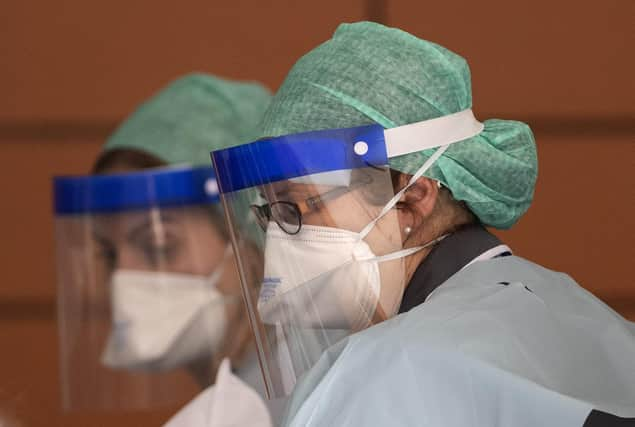Coronavirus crisis should have taught NHS about the benefits of treating staff as human beings, not assets – Dr Lewis Morrison


These last two to three weeks give cause for optimism as we cautiously start to exit lockdown, the number of cases of Covid-19 falls, and the number of patients in hospital and intensive care reduces.
For the first time in three months, many people working in healthcare might be forgiven for daring to hope we are properly coming out of this phase of the pandemic. It’s only natural to start looking to the future, and I think most of us are looking for positive things at a time like this.
Advertisement
Hide AdAdvertisement
Hide AdWith that in mind, I ask myself what we have learned about the NHS, what it’s like to work in healthcare during a time of crisis, and what have, even amidst the most difficult times, been the things that have been good or, dare I say it, better. What did we do well? What should we keep doing? What should we stop doing?
It would be easy to dust ourselves off and get back to doing things the same way we did them before, even though that will itself take time. However, it seems very clear that things can’t and won’t be the same again.
One of the most striking things about working in healthcare during the pandemic is how much healthcare staff have been appreciated. I’ve expressed my huge gratitude to the people of Scotland for that.
Working towards a common goal
But it’s not only that, it’s the day-to-day experience in the healthcare workplace where things have been noticeably different. Yes, dealing with the very sickest patients with Covid has been stressful and upsetting for many of us, but in many places lots of things have been done to try to balance that.
Some might seem small but they really do matter. Being able to park at work and not worry about how to get home after a long shift. Better rest and refreshment facilities. Much more visible and accessible support for staff. And beyond that, healthcare and managerial teams working together, abandoning hierarchies to work towards a common goal.
Barriers have come down across the health service, because we had a common purpose, ironically unfettered by the some of the day-to-day bureaucracy, targets to meet and the unrelenting “normal” pressures the NHS is always under.
As we look forward, we do also need to look back. In the 18 months or so before the pandemic, we saw several health boards in the media because of concerns over bullying and whistleblowing cases, best exemplified by the Sturrock report into NHS Highland.
Quality of care
Something was clearly wrong in many places with how NHS staff were being treated. A report was produced, with multiple recommendations, and a ministerial working group convened to deal with the raft of problems. But the message was clear – the NHS in Scotland as a workplace needed to change.
Advertisement
Hide AdAdvertisement
Hide AdSo looking to the future, maybe the answer is simpler than implementing dozens of recommendations, and the lesson is that caring for those who care, listening to them, working with them and providing better for their physical and mental well-being actually works. Treating people like individuals not as assets required to deliver on targets helps to have a healthcare workforce who feel appreciated.
And given we know workplace conflict affects the quality of care, the absence of that conflict is better for patients. Perhaps it shouldn’t take a pandemic to learn these things, but in Scotland I think we’re used to looking for the good out of the bad. The point is there’s a real chance to emerge from this crisis with an NHS that’s a better experience for those who work in it, and that has to be good for everyone.
Dr Lewis Morrison is chair of BMA Scotland
A message from the Editor:
Thank you for reading this article on our website. While I have your attention, I also have an important request to make of you.
With the coronavirus lockdown having a major impact on many of our advertisers - and consequently the revenue we receive - we are more reliant than ever on you taking out a digital subscription.
Subscribe to scotsman.com and enjoy unlimited access to Scottish news and information online and on our app. With a digital subscription, you can read more than 5 articles, see fewer ads, enjoy faster load times, and get access to exclusive newsletters and content. Visit www.scotsman.com/subscriptions now to sign up.
Our journalism costs money and we rely on advertising, print and digital revenues to help to support them. By supporting us, we are able to support you in providing trusted, fact-checked content for this website.
Joy Yates
Editorial Director
Comments
Want to join the conversation? Please or to comment on this article.